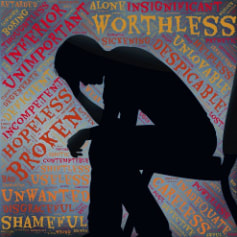 “I just don’t understand.” These are perhaps the most frequently used words spoken by loved ones in the wake of a suicide or suicide attempt. They are wise words. The fact is, we can’t understand the pain, despair, weariness, or hopelessness that leads to suicide. Each struggle is unique and takes place in isolation. From Willie Loman in Arthur Miller’s The Death of a Salesman, who becomes convinced his family is better off without him to Robin Williams who could not sustain his struggle with his mental health; from the retiree who suddenly lost his investments and was overwhelmed with a sense of failure and shame to the teen who just cannot take another day of bullying, shame, and despair; from the LBGTQ+ person who has been rejected by family, friends and seemingly, the whole culture to the newly diagnosed cancer patient who is terrified and cannot imagine healing, we can only understand in part, at best. Understanding why one takes their own life is elusive and often an exercise in futility. This does not, however, mean that we can’t understand suicide in general. It does not mean that we can’t have compassion – you don’t need to understand to love.
Suicide is a growing health crisis (and it is indeed a multi-dimensional health crisis) among all walks of life. If you think that “people like you” don’t commit suicide, you are wrong. The church has all too often dealt with suicide badly. Condemnation and rejection, instead of grace, compassion, and love have driven the “holy” response. For a people who proclaim that Christ came to the world to save, to bring hope, to find the lost, it is shameful that we have turned suicide into some ultimate sin which cannot be forgiven by God. Let me say this clearly – this is nonsense. Is suicide a sin? Since all sin is a broken relationship with God, neighbor, and creation, and since suicide is an act born of brokenness, we can call it sin. Taking the power to give and take life from God and asserting our own will is akin to the sin of trying to “be like God.” Yet, I don’t think that a person who has been driven to such despair is trying to be like God. I don’t think that rejecting God is at all what is happening when one considers taking their life. Further, the sin we should be looking for is the ways in which we, the “powers and principalities,” have acted to drive a person to feel so overwhelmed, hopeless, shamed, and out of options that they seek to end things by dying. Is the greater “sin” taking your own life or is it driving others to give up hope. I think it is the latter. Things this pastor wants you to know:
For more information about suicide prevention, read the ELCA Social Statement on the subject. Below you will find an excerpt from the statement about falsehoods and truth related to suicide. Pax Christi, Tim Olson – Lead Pastor Falsehood: People who talk about suicide rarely actually complete suicide; they are just wanting attention and should be challenged in order to “call their bluff.” The truth is that people who talk about suicide are serious and may be giving a clue or warning of their intentions. They should not be challenged or invalidated but given assistance in obtaining professional help. Falsehood: A person who has made a serious suicide attempt is unlikely to make another. The truth is that people who have made prior attempts are often at greater risk for dying by suicide. A suicide attempt is a cry for help and a warning that something is terribly wrong, and it should be taken with utmost seriousness. Falsehood: The suicidal person wants to die and feels there is no turning back. The truth is that suicidal people often feel ambivalent about dying. They often go through a long process in which they try various ways to reduce their profound emotional pain. The balance between their contradictory desires to live and to die shifts back and forth, even up to the time of taking their life. Falsehood: Most people who take their life have made a careful, well-considered, rational decision. The truth is that people considering suicide often have “tunnel vision”—in their unbearable pain they are blind to available alternatives. Frequently, the suicide act is impulsive. When their suffering and pain are reduced, most will choose to live. Falsehood: Asking about suicidal feelings will cause one to attempt suicide. The truth is that asking a person about suicidal feelings provides an opportunity to get help that may save a life. The listener should ask if the person has formulated a plan and has access to the means to carry it out. If the intent or plan and its means are there, the suicidal person should not be left alone but should be helped to get treatment immediately. From: ELCA Social Statement on Suicide Prevention
2 Comments
Kristin Tague
9/15/2022 09:39:02 pm
Great post, Pastor Tim! My heart is filled with compassion for people who are struggling. My heart goes out to anyone experiencing that level of pain and hopelessness and also for the family and friends who remain after a suicide.
Reply
Ann Thye
9/22/2022 10:33:39 pm
Thank you for sharing this reflection and information Pastor Tim.
Reply
Leave a Reply. |
Categories
All
Archives
July 2024
|


 RSS Feed
RSS Feed

